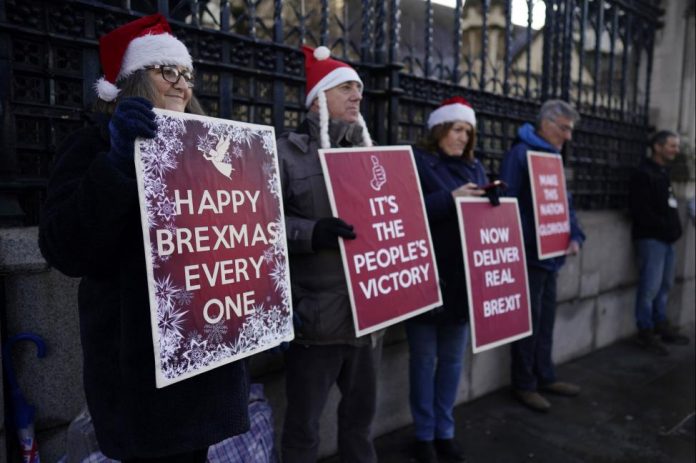British Parliament, led by a newly elected Conservative majority, on Friday approved Prime Minister Boris Johnson‘s proposal to leave the European Union — something lawmakers previously rejected on four separate occasions this year.
Full approval would fulfill Johnson’s campaign pledge to “get Brexit done,” which helped his Conservative Party to a decisive 80-seat House of Commons majority in elections last week. Friday’s key first step broke a parliamentary deadlock on the EU exit that dates back to former Prime Minister Theresa May’s administration early this year.
Parliament rejected May’s exit plan in January and twice in March, and ultimately Johnson’s first attempt in October.
With the help of the new Conservative majority, lawmakers voted 358-234 to approve the measure on its second reading Friday.RELATED Queen Elizabeth II vows to finish EU exit in speech to Parliament
The step puts Britain on track to depart the EU, as scheduled, on Jan. 31, more than three years after voters first approved the referendum to leave. Lawmakers still must debate and approve the final stages of the plan between Jan. 7-9 after they return from the Christmas recess. The House had approved Johnson’s plan in October but rejected its debate schedule, ultimately leading the government to withdraw the bill.
Speaking in the House of Commons before the vote, Johnson said passage would settle the politically paralyzing issue once and for all after years of debate and division, and enable Britain to “move on” as a nation.
“This is the time when we move on and discard the old labels of ‘leave’ and ‘remain,'” he said.
RELATED Brexit: Boris Johnson’s plan would finish EU exit by end of 2020
The provisions of the bill establish a one-year “transition” period in which the government will negotiate its new trading relationship with the EU. But controversially, it outlaws any extension for the transition beyond December 2020, setting up the possibility of a “no-deal” exit in which Britain would default to World Trade Organization rules with Europe.
Under the WTO scenario, some British exports to Europe would immediately be subject to very high tariffs. For instance, automobiles would be taxed at 10 percent while dairy products would face a 35 percent levy.
Labor Party leader Jeremy Corbyn blasted Johnson’s removal of workers’ rights protections from the withdrawal bill, warning its divergence from EU standards would put Britain in a “race to the bottom.
“RELATED Banking system can hold up under no-deal Brexit, Bank of England says
The deal, he said, “will be used as a battering ram to drive us down the path of yet more deregulation and towards a toxic deal with Donald Trump that will sell out our [National Health Service] and push up the price of medicines to benefit the giant U.S. drug corporations.
“RELATED Conservatives win greatest majority in 32 years; Johnson vows to leave EU
(UPI)

Putting a spotlight on business, inventions, leadership, influencers, women, technology, and lifestyle. We inspire, educate, celebrate success and reward resilience.















